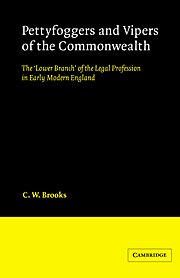 Pettyfoggers and Vipers of the Commonwealth
Pettyfoggers and Vipers of the Commonwealth In concluding this study of the lower branch of the legal profession, two related problems need to be addressed. First, the place of the early modern practitioners within the wider context of the history of the professions in general must be established. Second, the various pieces presented in earlier chapters must be brought together into a more concise picture of the role of these lawyers in late-sixteenth-and early-seventeenth-century society.
Amongst social theorists and modern historians, it is a common place that, since the Industrial Revolution, the professions have come to occupy a uniquely important place in the social and political life of modern capitalist society. Some have gone so far as to welcome this development as heralding new occupational structures and new class interests. Others are more doubtful about the benefits of the process of ‘ professionalization’. But few would question that the emphasis on specialized training, self-regulation, and sense of vocation which are characteristic of professional men have greatly influenced modern attitudes towards work and social structure. As Talcott Parsons has put it, the importance of the professions in the twentieth century is unique in history.
In the most general sense, this comment is no doubt true enough. The decline of the landed interest and of traditional vocational structures associated with craft guilds, coupled with the emergence of groups such as engineers and scientists who are associated with modern technology, has indeed given professionals an important role. However, from the point of view of the historian, this twentieth-century familiarity with professions has had the effect of severely distorting our perspectives on their development.
To save this book to your Kindle, first ensure [email protected] is added to your Approved Personal Document E-mail List under your Personal Document Settings on the Manage Your Content and Devices page of your Amazon account. Then enter the ‘name’ part of your Kindle email address below. Find out more about saving to your Kindle.
Note you can select to save to either the @free.kindle.com or @kindle.com variations. ‘@free.kindle.com’ emails are free but can only be saved to your device when it is connected to wi-fi. ‘@kindle.com’ emails can be delivered even when you are not connected to wi-fi, but note that service fees apply.
Find out more about the Kindle Personal Document Service.
To save content items to your account, please confirm that you agree to abide by our usage policies. If this is the first time you use this feature, you will be asked to authorise Cambridge Core to connect with your account. Find out more about saving content to Dropbox.
To save content items to your account, please confirm that you agree to abide by our usage policies. If this is the first time you use this feature, you will be asked to authorise Cambridge Core to connect with your account. Find out more about saving content to Google Drive.